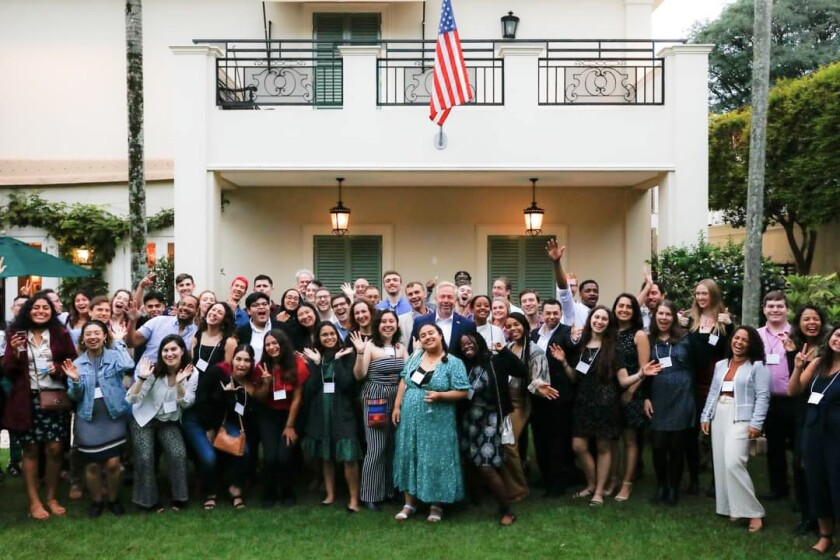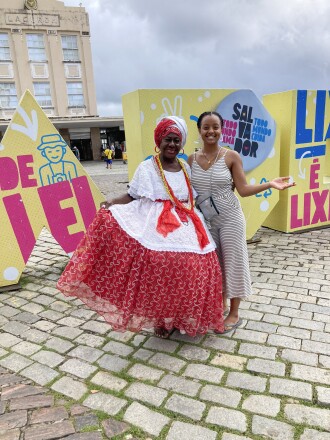SALVADOR, Brazil — One of Aisha Kimbrough’s most rewarding experiences has been moving to a totally new place and finding comfort in unfamiliarity, and receiving a prestigious U.S. Fulbright English Teaching Award has allowed her to do that again — this time in Brazil.
Kimbrough applied for the Fulbright program in fall 2019 through Whitman College, her undergraduate institution. She received the award in 2020, but the program was delayed due to the COVID-19 pandemic; as such, she started in April 2022 and will be in Brazil until mid-December.
“My interest in language-learning stems from my personal story as a daughter to an Eritrean mother and Jamaican-American father, and also growing up in a diverse, global community like Worthington,” Kimbrough said.
As a child listening to her family communicate in multiple languages, she grew to understand hat language serves as communication, but also as a method for building community, resisting dominant narratives and preserving culture, history and identity, she said. Worthington’s racial and ethnic diversity also meant that the global was local, and hearing Oromo, Karen, Mam, Spanish and Thai spoken on a regular basis made Kimbrough especially keen on language-learning and education too.
After her undergraduate work, she moved to Seville, Spain, and taught English at a public high school for two years, which helped her expand her knowledge of education and its significance.
ADVERTISEMENT
Now she teaches English to undergraduate and graduate students alike at the Federal University of Bahia in Salvador, Bahia, Brazil.
“I lead my own conversation, English language, and U.S. culture classes where I get to learn from my students and have intellectual conversations on racism, inequality, African history, and much more,” Kimbrough said. “What I learned is that oftentimes, it is thought that school is somehow politically neutral or disassociated with social issues such as race, class, etc. But my experience in Spain and currently now in Brazil demonstrates the exact opposite: educational spaces like the classroom are at the crux of social and political inequities.”

Those classrooms have differed significantly based on students’ ages, school resources and the political and social climate, too. In Spain, she worked with middle- and high-school-aged students, and witnessed “a lot of disrespect and devaluation of educators,” which she said she also saw applied to grade school teachers in the U.S. In Brazil, she teaches at the university level, where students are in school because they want to learn rather than because they have to be there.
The Fulbright program requires its students to develop a community engagement project, and Kimbrough’s centers on Afro-Brazilian history and culture.

“I almost feel a sense of affinity to my placement city as there is so much African influence in the Bahian cuisine, music, and the Afro-Brazilian religion, Candomblé,” Kimbrough explained. “Similar to the U.S., Brazil too enslaved Africans for decades and although slavery was abolished, Black people continue to be persecuted and oppressed.”
It isn’t the first time she’s worked with the subject matter, as she wrote her undergraduate thesis on Tropicália, a Brazilian artistic movement of the 1960s that brought together a variety of genres and traditions — and one in which music became a form of resistance to Brazil’s military rule.
“In my thesis I discovered many historical parallels between the United States and Brazil, which is why I chose to carry-out my Fulbright award in Brazil,” Kimbrough said, noting that Tropicália arose at about the same time as the Black Power movement in the U.S.
And then there’s samba music, which grew out of Afro-Brazilian traditions and communities.
ADVERTISEMENT
“When you walk the streets of Salvador, you will hear samba in many streets, corners, and alley ways,” Kimbrough said. “I will never forget what one Brazilian friend of mine told me: ‘Samba turns cries of decades of suffering into a timeless music that we all enjoy.’”
African American and Afro-Brazilian also often intertwine and borrow musical elements and sounds from each other, Kimbrough said.

“For example, when we listen to American Jazz music, take John Coltrane or even Pat Metheny, you will hear lots of syncopated beats which is very prominent in Afro-Brazilian samba and even contemporary Afro-Brazilian trap and hip-hop music,” she explained.
“Every day I am here, I’m reminded where we all come from: Africa,” Kimbrough said. “I am also reminded of the various ways we preserve heritage: folk song, patterned fabrics, spicy “pimenta” in food, that even in the thick of a rapidly globalizing and digitalized world, history, heritage and modernity can all exist at the same time.”
She wishes everyone had the opportunity to travel.
“We should embrace difference more and see it as an opportunity to grow (intellectually, emotionally, physically, etc.) versus an attack on your beliefs or personhood,” Kimbrough said. “In Worthington, the growing racial and ethnic diversity affords us endless opportunities to learn from and with one another.
“The world is so great and we are so small. But I think that when we learn how to open our eyes, minds, and hearts to the unknown or to discomfort, is when we become better people and a healthier community.”












